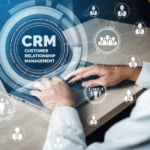CRM (Customer Relationship Management) tools and solutions are essential for businesses looking to manage interactions with their customers effectively. These tools enable organizations to streamline processes, improve communication, and enhance customer satisfaction. Here’s an overview of CRM tools and solutions:
1. Contact Management:
CRM systems provide a centralized database for storing customer contact information, including names, addresses, phone numbers, and email addresses. This feature allows businesses to maintain accurate and up-to-date records of their customers and leads.
2. Lead Management:
Lead management functionality helps businesses track and manage potential customers throughout the sales pipeline. CRM tools automate lead capture, qualification, assignment, and follow-up, ensuring that no opportunity falls through the cracks.
3. Sales Automation:
CRM systems automate various sales-related tasks, such as email outreach, appointment scheduling, and pipeline management. These tools help sales teams work more efficiently and focus on closing deals rather than administrative tasks.
4. Opportunity Management:
Opportunity management features allow businesses to track sales opportunities from initial contact to final closure. CRM tools provide visibility into the status of each opportunity, enabling sales teams to prioritize their efforts and forecast revenue more accurately.
5. Pipeline Visualization:
CRM solutions often include visual representations of sales pipelines, such as kanban boards or funnel charts. These visualizations help sales managers and reps quickly assess the health of their pipelines and identify bottlenecks or areas for improvement.
6. Customer Service and Support:
CRM systems support customer service and support functions by providing tools for managing support tickets, tracking customer inquiries, and monitoring service level agreements (SLAs). These features help businesses deliver timely and effective support to their customers.
7. Marketing Automation:
Many CRM platforms offer integrated marketing automation capabilities, allowing businesses to create and execute marketing campaigns, track campaign performance, and nurture leads through automated workflows. This integration enables seamless communication and alignment between sales and marketing teams.
8. Analytics and Reporting:
CRM tools provide robust analytics and reporting capabilities, allowing businesses to track key metrics such as sales performance, customer satisfaction, and campaign ROI. These insights help businesses identify trends, make data-driven decisions, and continuously improve their processes.
9. Mobile Accessibility:
Modern CRM solutions offer mobile apps or responsive web interfaces, enabling users to access CRM data and functionality from anywhere, at any time. This mobile accessibility ensures that sales reps and other team members can stay productive while on the go.
10. Integration with Third-Party Applications:
CRM systems often integrate with other business tools and applications, such as email marketing platforms, accounting software, and productivity tools. These integrations streamline workflows, eliminate data silos, and provide a more holistic view of customer interactions.
By leveraging CRM tools and solutions, businesses can build stronger relationships with their customers, drive sales growth, and ultimately, achieve their business goals.










